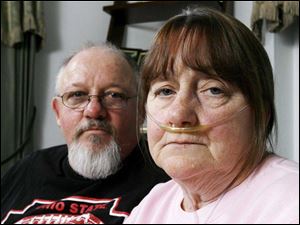
Financial woes forcing the ill to ask for aid
5/11/2008
Linda Laffartha awaits a lung transplant. She and husband Herb seek donations to cover the procedure and post-treatment costs.
Linda Laffartha didn't know cigarettes were damaging when she started smoking in the early 1960s.
These days the 59-year-old Toledoan knows addiction fueled her need to smoke, which eventually topped more than three packs a day until she quit more than 10 years ago. Still, Mrs. Laffartha - whose lungs are so diseased she has required oxygen at all times for two years - feels guilty.
"I did it to myself," Mrs. Laffartha said. "That's the hard part."
Yet with the need to come up with $8,000 to $12,000 before she can get a lung transplant at Cleveland Clinic, Mrs. Laffartha and her family started making public pleas for help about two months ago. Relatives have placed collection cans on counters at several businesses, various fund-raisers are in the works, and tax-deductible donations for Mrs. Laffartha can be made directly to the National Transplant Assistance Fund & Catastrophic Injury Program.
Herb Laffartha, Jr., said he isn't concerned his wife's history of smoking will turn away donors.
"It would be different if it was an isolated case, but there's thousands of cases like that," he said.
Families such as the Laffarthas increasingly are turning to spaghetti dinners and other fund-raising efforts to help cover mounting health-related expenses.
Five years ago, for example, the National Transplant Assistance Fund opened 30 funds for patients in a busy month. Now that number is approaching 40, said Susann Reiher, patient services coordinator for the nonprofit in Radnor, Pa.
"We're opening record numbers of funds each month," she said. "It's been amazing, really amazing."
Locally, the American Cancer Society is fielding more calls from patients seeking help with raising money for medical-related expenses, especially in the last 18 months, said B.J. Fischer, an organization spokesman.
Some businesses have changed insurance plans and are shifting more onto employees, who then may have higher co-payments or deductibles, Mr. Fischer said. Some patients have lost jobs with good insurance, and their new employers have lesser or no coverage, he said.
In the case of Mrs. Laffartha, who has emphysema and chronic obstructive pulmonary disease, Medicaid will cover the transplant as long as it is done in Ohio. But she needs money for a place to stay near Cleveland for up to two months after the surgery, along with medications and equipment, the family said.
Examples of local medical fund-raisers abound.
Just last month, family members held a spaghetti dinner fund-raiser for an 8-month-old baby who a Toledo woman, Crystal Barnett, allegedly threw into a nightstand while babysitting. Perrysburg Township firefighters last year held a benefit for a department member, Chad Merrick, who was diagnosed with colorectal cancer at 32.
When choosing to whom to donate money, it's advisable to select one who uses a bank, attorney, agency, nonprofit, or other third party to collect funds to help ensure they are used for intended medical purposes, said Dick Eppstein, president of the Better Business Bureau of Northwestern Ohio and Southeastern Michigan.
The Better Business Bureau doesn't track individual fund-raisers. But it does rate charities and nonprofits such as the National Transplant Assistance Fund & Catastrophic Injury Program, which meets all of the Better Business Bureau's standards, Mr. Eppstein said.
Ms. Reiher, of the Pennsylvania nonprofit, said individual fund-raising works best if people have connections within schools, churches, synagogues, and other groups in their communities. She said she guides families with their fund-raising efforts, which must be Internal Revenue Service compliant, and the nonprofit gets 4 percent of donations to cover its costs.
The Laffarthas sought fund-raising suggestions from several organizations, including the American Lung Association, and Mr. Laffartha even called R.J. Reynolds Tobacco Co. The cigarette maker offered no suggestions, but Burger King, Marco's Pizza, and other local businesses are helping out, he said.
Mrs. Laffartha's lung condition worsened in October, 2006, when she was hospitalized for a few weeks, and she since has sought help for prolonged coughing spells, pneumonia, and upper respiratory infections. She needs oxygen wherever she goes and is afraid to travel far from home, her husband of 29 years said.
"It's getting worse," Mrs. Laffartha said. "It seems like I was sick all of the time. No matter what I did, it didn't get better."
Contact Julie M. McKinnon at:
jmckinnon@theblade.com
or 419-724-6087.